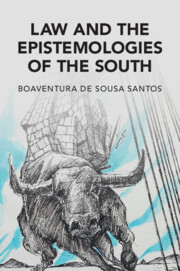Book contents
- Law and the Epistemologies of the South
- CAMBRIDGE STUDIES IN LAW AND SOCIETY
- Law and the Epistemologies of the South
- Copyright page
- Contents
- Preface
- Abbreviations
- Part One The Tragic Optimism of the Law: THE END OF A STORY
- Part Two Epistemologies of the South and the Law
- Part Three The Abyssal Law under the Mode of Abyssal Exclusion
- Part Four Real Legal Utopias: Interrupting the State
- Part Five Real Legal Utopias: Interrupting the Law
- Fourteen Law and Revolution in Portugal: Experiences of Popular Justice after the Carnation Revolution of 1974
- Fifteen Popular Justice in Cape Verde
- Sixteen The Landless Rural Workers’ Movement in Brazil and Its Struggles for Access to Law and Justice
- Seventeen The Law of the Excluded: Indigenous Justice and Plurinationality in Bolivia and Ecuador
- Eighteen Decolonising Justice and Democratic Peace in Colombia
- Part Six Real Legal Utopias: Interrupting Hegemonic Human Rights
- References
- Index
- Cambridge Studies in Law and Society
Fourteen - Law and Revolution in Portugal: Experiences of Popular Justice after the Carnation Revolution of 1974
from Part Five - Real Legal Utopias: Interrupting the Law
Published online by Cambridge University Press: 07 August 2023
- Law and the Epistemologies of the South
- CAMBRIDGE STUDIES IN LAW AND SOCIETY
- Law and the Epistemologies of the South
- Copyright page
- Contents
- Preface
- Abbreviations
- Part One The Tragic Optimism of the Law: THE END OF A STORY
- Part Two Epistemologies of the South and the Law
- Part Three The Abyssal Law under the Mode of Abyssal Exclusion
- Part Four Real Legal Utopias: Interrupting the State
- Part Five Real Legal Utopias: Interrupting the Law
- Fourteen Law and Revolution in Portugal: Experiences of Popular Justice after the Carnation Revolution of 1974
- Fifteen Popular Justice in Cape Verde
- Sixteen The Landless Rural Workers’ Movement in Brazil and Its Struggles for Access to Law and Justice
- Seventeen The Law of the Excluded: Indigenous Justice and Plurinationality in Bolivia and Ecuador
- Eighteen Decolonising Justice and Democratic Peace in Colombia
- Part Six Real Legal Utopias: Interrupting Hegemonic Human Rights
- References
- Index
- Cambridge Studies in Law and Society
Summary
In this and the following chapters, I analyse several attempts to interrupt the abyssal nature of modern law emerging from my previous research on sociology of law. I try to identify the reasons why most of such attempts failed or are about to fail. This chapter analyses the phenomenon of popular justice in Portugal during the revolutionary crisis that became known as the 25 April Revolution or Carnation Revolution. During the course of the revolutionary crisis (April 1974-November 1975) many popular movements emerged. They differed in terms of social objectives, strategy and tactics, organisational strength, degree of control by formal political organisations, and other factors, but shared the same class composition: the urban or rural working class (and occasionally the peasantry) allied themselves with radicalised sectors of the urban petty bourgeoisie. As these movements emerged during a revolutionary crisis, all of them questioned the legitimacy of the capitalist state. Popular justice in Portugal after 25 April 1974 involved a wide range of actions varying in political scope, the degree and type of popular mobilisation and internal organisation, and the level of confrontation with official justice. As a descriptive strategy, the range of cases and situations may be grouped into two categories: the struggle for the redefinition of criminal justice, and the struggle for the right to decent housing. Within each category, I begin with a brief narrative of cases that relate more or less remotely to the concept of popular justice and then concentrate my analysis on the most representative examples. Were there failed attempts at post-abyssal legality?
Keywords
- Type
- Chapter
- Information
- Law and the Epistemologies of the South , pp. 411 - 438Publisher: Cambridge University PressPrint publication year: 2023

